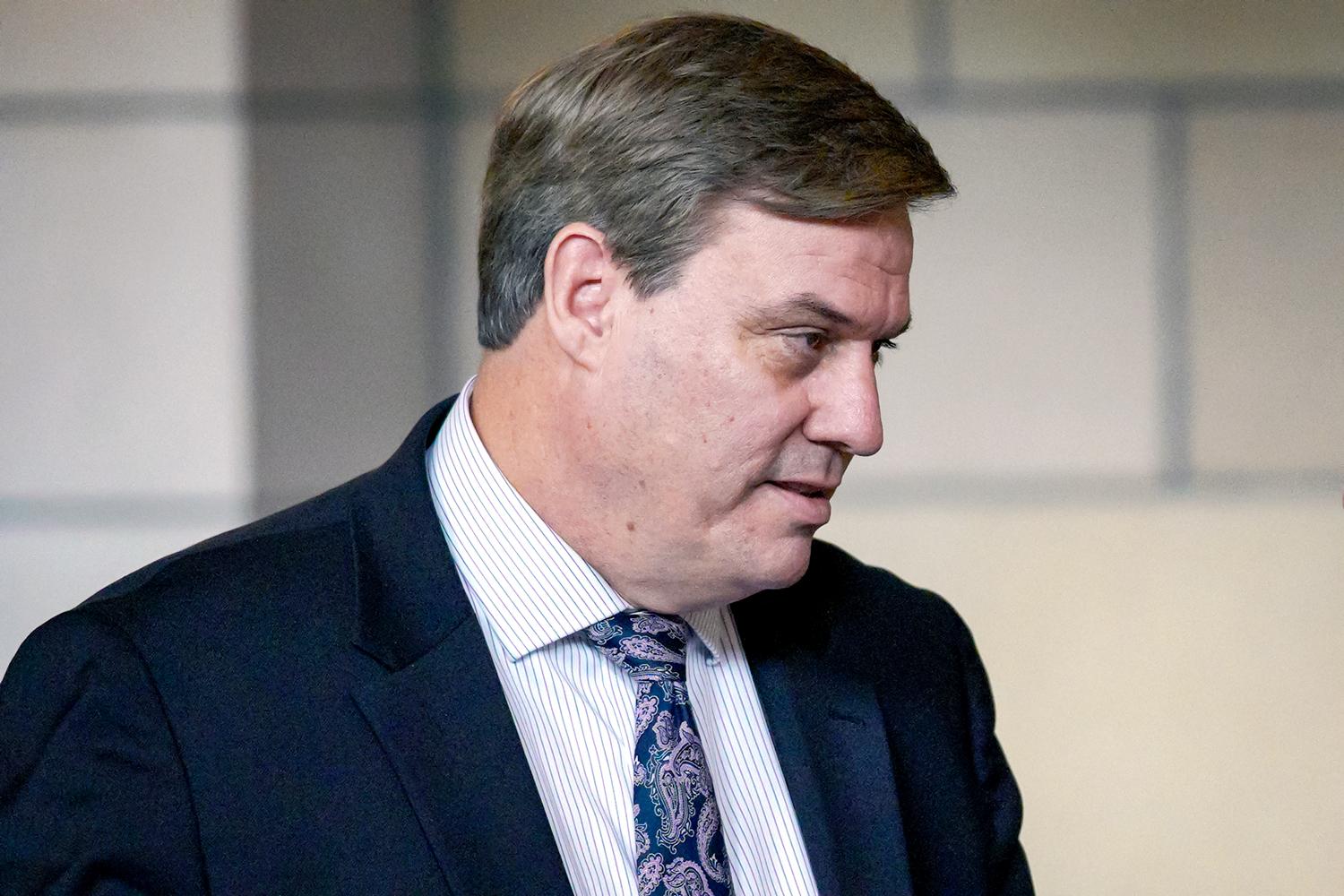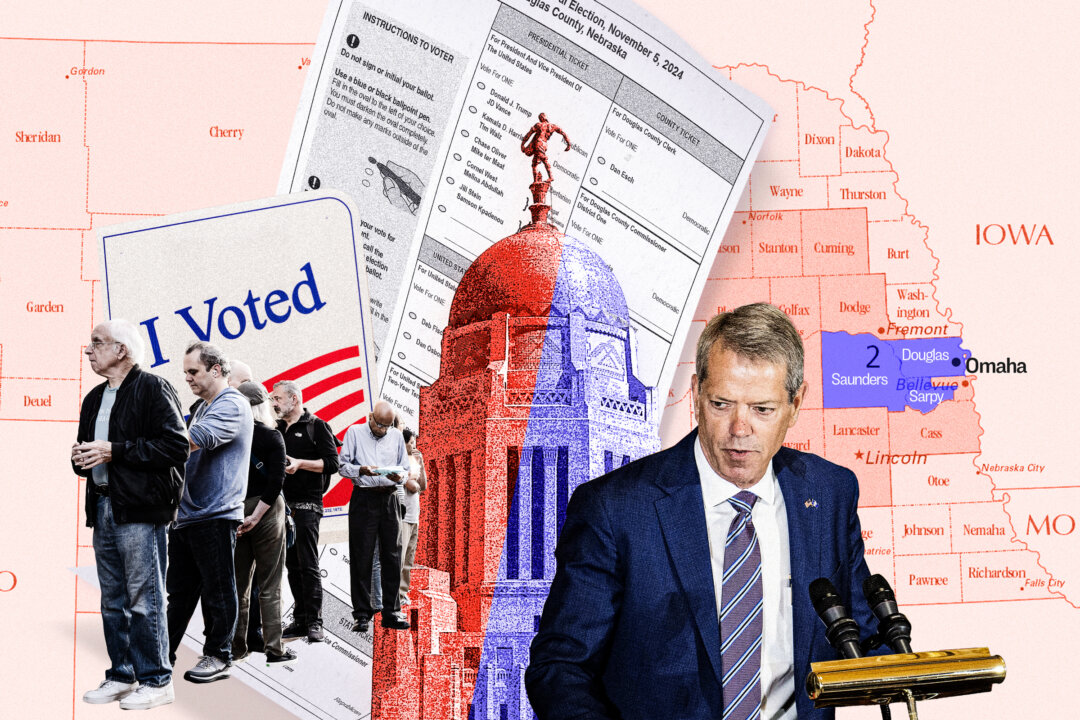The palpable anxiety about the closeness of the U.S. presidential election materialized in an unexpected location this year: Lincoln, Nebraska.
After months of action inside the Nebraska State Capitol and a surge of last-minute politicking from national Republican Party figures, on Sept. 24, Nebraska Gov. Jim Pillen announced he will not call a special session to restore winner-take-all electoral college voting in the Cornhusker state.
Every state but Nebraska and Maine direct all of their electoral votes toward whichever candidate wins the popular vote in that state.
With only weeks until the Nov. 5 general election, political prognosticators in both the Democratic Party and Republican Party are studying the map. They are beginning to believe the Electoral College vote count may be so close that a single vote could be decisive.
Winner Take All
Nebraska, with five electoral votes, assigns an electoral vote to each of its three Congressional Districts and awards two based on the cumulative statewide ballot. It began splitting its electoral vote in 1992.
Since its split, Nebraska has consistently voted for Republican presidential candidates. However, in 2008 and 2020 its 2nd Congressional District, centered on Omaha, Nebraska, sent one of the state’s electoral votes to the Democrats.
In 2024, the nonpartisan, unicameral Nebraska Legislature once again took up the issue of reverting to winner-take-all electoral voting.
On Sept. 13, Pillen announced he would consider calling a special legislative session to vote on a restoration. Since April, he had been pushing the body to get a bill on his desk. However, with the general election only weeks away, Pillen said he will not call a session unless he had a “clear and public” indication that a filibuster-proof 33 of the body’s 49 senators were on board.
Dan Shea, a professor of government at Colby College, said there was “grumbling and consternation” in Maine about Nebraska potentially changing its state’s rules so close to Nov. 5. He said lawmakers in the Midwestern state were likely well aware of a deadline prohibiting Maine from changing its rules on Electoral College voting within 90 days of officially casting its electoral votes on Dec. 17.
State Sen. Loren Lippincott, a supporter of reverting to winner-take-all, as it was pre-1992, told the Epoch Times the Legislature has attempted to overturn what he calls the “district plan” in 1995, 1997, 2000, 2001, 2003, 2006, 2014, and 2015. In 1995 and 1997, a bill passed and was vetoed by former Nebraska Gov. Ben Nelson.
Lippincott said Nebraska initially adopted the district plan as an “experiment.”
“It did not catch on! [The] experiment is over!” Lippincott wrote in an email to the Epoch Times. “No other states have joined the district plan. If it were such a good idea, California, Massachusetts, New York, Illinois, and Colorado would join.”
Lippincott said the district plan isn’t making Nebraska any more relevant to the national conversation, either. Instead, it is encouraging presidential candidates to visit just the Omaha area and focus only on appealing to those voters rather than the entire state.

With concern rising about a close matchup between former President Donald Trump and Vice President Kamala Harris Nebraska’s congressional representatives—Reps. Mike Flood, Rep. Don Bacon, Adrian Smith, Sen. Deb Fisher, and Sen. Pete Ricketts, all Republicans— sent an open letter to Lincoln on Sept. 18 urging a special session.
Lippincott confirmed that Sen. Lindsey Graham (R-S.C.), an ally of Trump’s and a leading voice in the conservative wing of the GOP, traveled to a meeting in the Nebraska Governor’s Mansion to encourage state senators to support a winner-take-all plan.
No Consensus
The special session was officially stymied when one member of the Legislature—state Sen. Mike McDonnell—announced he would not support making a change so close to the election date.
“For Omaha, the city I love and have called home for 58 years, it brings tremendous national attention, is impactful to our local economy, and forces presidential candidates to make their case to all Nebraskans instead of just flying over,” McDonnell wrote in a statement issued on Sept. 23.
Representatives for McDonnell did not respond to a request for comment from The Epoch Times.
The following day, Pillen released another statement saying he was “profoundly” disappointed by the decision and would not be calling for a special session.
McDonnell also drew Trump’s scorn. in a Truth Social post, the former president called McDonnell a “grandstander” who “decided, for no reason whatsoever, to get in the way of a great Republican, common sense, victory.”
A senior staff member in the Legislature who spoke to The Epoch Times said McDonnell was formerly a conservative Democrat but recently crossed the aisle to the Republican Party over the issue of abortion. Moreover, the staff member said McDonnell is expected to run for mayor of Omaha soon and likely wanted to make good on his existing commitment to hold firm on the Electoral College issue.

The senior staff member said there is a significant amount of advertising money that flows into the Omaha media market every four years because of the state’s split voting. The split also attracts federal candidates to Nebraska who may otherwise write off the upper Midwest after the Iowa caucuses.
According to the political spending tracking firm AdImpact, Harris and her Democratic allies have already spent $11 million on advertising in Omaha to win the 2nd Congressional District vote.
Both times the vote peeled off for Democrats, the party’s candidate prevailed in the Electoral College.
Looking Ahead
People in both Maine and Nebraska said their states’ Electoral College voting rules may well change depending on the outcome of the 2024 presidential election.
Dan Shea, a professor of government at Colby College, told the Epoch Times that Mainers are well accustomed to their split voting and aren’t necessarily eager to change how it’s done. However, he expects a tit-for-tat action in Augusta, Maine, if Nebraska goes back to winner-take-all and potentially tilts presidential elections toward the GOP.
“It will be a steamroller of action to move Maine’s rules only because of the anger that will swell up that Nebraska did that,” Shea said.
Maine, with four electoral votes, began splitting its electoral vote in 1972. Like its western counterpart, it grants two votes to each of its Congressional Districts and assigns the other two based on statewide results.
From 1972 to 1992, Maine reliably voted Republican in presidential elections. After 1992, Maine became solidly blue. However, it sent a dissenting electoral vote to the GOP in 2016 and 2020.

Shea said it’s likely Maine will send a vote to Trump for the third straight presidential election, thanks to rural voters loyally backing him.
In Nebraska, Lippincott said he will support another bill to reject split electoral voting in the forthcoming legislative session.
A senior staffer in the Nebraska Legislature said he thinks the only way any change will happen is through an initiative petition process. A petition could revise the state’s constitution and bring it back to winner-take-all voting, but that will take political organization and significant fundraising, the staffer said.
As a country, polling shows Americans would prefer to move on from the Electoral College. According to a September survey published by the Pew Research Center, 63 percent of respondents think the popular vote should determine the outcome of the presidential election.
Gary Bugh, a professor of political science at Texas A&M University Texarkana who wrote a book about reforming the Electoral College in 2016, told the Epoch Times the system is likely to stay in place in the United States because it perpetuates the dominance of a two-party system. In a winner-take-all scenario, there’s no reward for finishing in second place.
Bugh said there were significant efforts to remove the Electoral College in the 1960s and 1970s in favor of the popular vote, but those movements never left the halls of Congress. For a change to happen, the United States would need to amend the Constitution. He handicapped the chances of a change at “slim to none.”
At the beginning of October, national polling indicated the 2024 presidential race could come down to a single electoral vote.
“More so than maybe any election in memory, it’s going to be extremely close,” Shea said. “There’s a very realistic scenario that it does come down to that vote in Omaha.”






